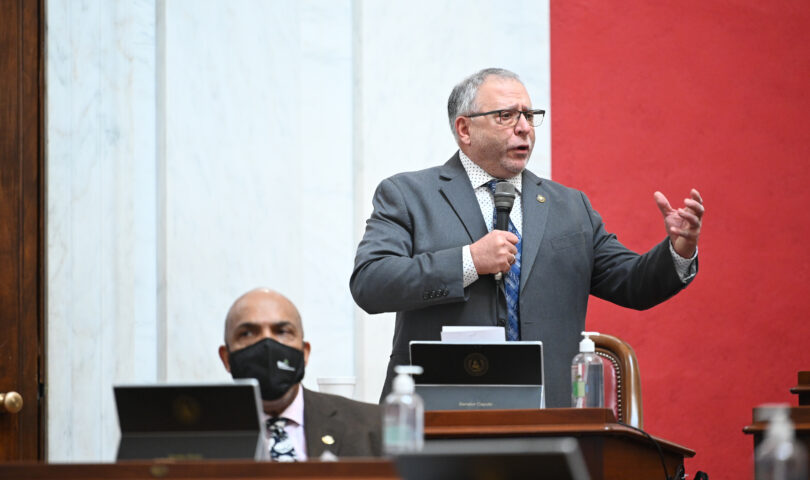MORGANTOWN – The state Senate spent a couple hours Tuesday debating and then passing two bills placing new limitations and requirements on unemployment benefits. Supporters said they will attract new businesses and encourage people to get back to work. Opponents said they will just make it harder for laid-off workers to find new jobs.
Proposed Democratic amendments to both failed along party lines.
Senators first took up SB 3. It’s called the Jobs and Reemployment Act and requires a person seeking unemployment benefits to complete four of 10 work-search activities per week, including such things as searching state and other online job matching systems, completing job applications or following through on job referrals from WorkForce West Virginia, and participating in avialable job training.
It also sets up requirements for WorkForce to share job openings and track applicants’ progress.
WorkForce testimony in Judiciary Committee indicated that most people find work within six weeks and that WorkForce offers various types of assistance for six weeks.
Sen. Richard Lindsay, D-Kanawha, offered an amendment to extend that help for WorkForce to 12 weeks, to conform to the requirements of SB2, which was taken up next. The amendment failed 11-23.
Sen. Ron Stollings, D-Boone, offered one to allow someone who takes a full-time job that WorkForce deems nonsuitable – whether because of distance or lower pay or another reason – to retain full benefits while continuing to search for suitable work. It also failed 11-23.
Speaking for the bill, Finance chair Eric Tarr, said in 2019, before the pandemic, West Virginia ranked seventh nationally for the cost of unemployment taxes as a percentage of total wages. The ranking got worse during the pandemic, rising to third most expensive in 2021. With passage of this bill, the state could improve to 13th.
Lindsay opposed the bill, saying increasing the weekly number of required work-search activities from one to four puts up more hoops for job seekers to jump through.
Given that less than 8,000 people are currently receiving unemployment benefits and most people get back to work within six weeks, “I see no reason for this bill.”
Stollings said the bill presumes most people collecting benefits are frauds and this will add undue hardships.
Minority Leader Stephen Baldwin, D-Greenbrier, said WorkForce testified that the two chief obstacles to getting back to work are lack of transportation and child care; the bill addresses neither.
Supporting the bill, Majority Leader Tom Takubo, R-Kanawha, said they hear from employers that 50 people apply for jobs to maintain their benefits but only three show up for interviews. The bill “tries to say, ‘We want to help you get back on your feet.”
The bill also helps laid-off job seekers, Takubo said, by allowing them to collect full benefits if they work part-time to help makes ends meet. No other state does that.
Tarr said that by helping to lower the cost of unemployment premiums, the bill takes down a barrier to drawing new businesses that will offer more jobs.
Tarr also said the bill requires WorkForce to connect job seekers to the thousands of open state jobs. “I’ve not seen that anywhere.
It passed 23-11on party lines and goes to the House of Delegates.
SB 2 reduces the maximum period of unemployment benefits from 26 weeks to a span indexed to the state unemployment rate. If the rate falls below 5.5%, the maximum duration will be 12 weeks.
The duration rises by one week for each half-percent rise in unemployment, capped at 20 weeks for any rate 9% or above.
It also requires several measures by WorkForce to combat fraudulent claims: check the unemployment benefit rolls against state death records each month; verify the identity of claimants; and confirm eligibility by checking multiple claims from the same IP address, claims from foreign IP’s and mutiple or duplicate claims from the same mailing address.
Lindsay offered an amendment to keep the fraud-fighting portion of the bill but strike the reduced and indexed time span for benefits.
Judiciary chair Charles Trump, R-Morgan, defended the indexing in comments opposing the amendment. “What’s magic about 26 weeks,” he asked. It’s an arbitrary number. The indexing is a valuable took for charting the state’s future, by recognizing that the duration of benefits should be tied to the availability of jobs.
Nine states have enacted indexes, he said, and three of them – Florida, Georgia and North Carolina – rescued their unemployment programs by doing it.
And since most people find work within six weeks, he said, the 12-week minimum is twice that.
Sen. Mike Romano, D-Harrison, said, “I’ve had a hard time with this bill, and SB 3.” Workforce participation is low and there’s no evidence from the other states that their indexes increases that.
Sen. Mike Caputo, D-Marion, talked about his own experience years ago when he got laid off on the day he and his wife were going to secure the loan for their first home. He was off work for six months and his wife had to take a low-wage waitress job. Neither bill does anything to ease that pain.
There will always be people who try to game they system, he said. The state’s job is to combat that abuse, not eliminate the program.
Baldwin again cited WorkForce, saying unemployment claims fraud during the pandemic came from bots, computer programs and organized crime. WorkForce needs appropriate software and equipment to fight that, but it’s not in this bill.
Takubo said unemployment premiums are a tax paid by businesses and that money creates a finite pool to help people who lose their jobs. Fraud exists: WorkForce called him to tell him they received a claim and he hadn’t worked for two years. High premiums hinder businesses from coming here.
It passed 20-14 with three Republicans joining the minority. All local senators voted with their party.
This bill also goes to the House.
Tweet David Beard @dbeardtdp Email dbeard@dominionpost.com




